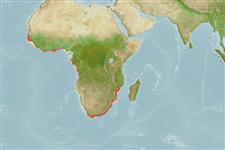Teleostei (teleosts) >
Mugiliformes (Mullets) >
Mugilidae (Mullets)
Etymology: Chelon: Greek, chelone = turtle (Ref. 45335).
Eponymy: Auguste Henri André Duméril (1812–1870), was a physician and zoologist like his father (see next entry) and followed much in his father’s footsteps. [...] (Ref. 128868), visit book page.
More on author: Steindachner.
Issue
Genetic data indicate that Chelon dumerilii is a complex of two species, one from Northwest and West central African coasts (= C. dumerilii), one in southeastern African coasts (Refs. 114224, 123262).
Environment: milieu / climate zone / depth range / distribution range
Ecology
Marine; freshwater; brackish; demersal; catadromous (Ref. 51243). Tropical; 20°C - 25°C (Ref. 13614); 21°N - 36°S, 20°W - 38°E
Eastern Atlantic: Mauritania to South Africa (Ref. 3573, 57400). Western Indian Ocean: Delagoa Bay, Mozambique to Mossel Bay, South Africa (Ref. 81659).
Length at first maturity / Size / Weight / Age
Maturity: Lm 17.0 range ? - ? cm
Max length : 40.0 cm TL male/unsexed; (Ref. 4393); common length : 18.0 cm SL male/unsexed; (Ref. 7399)
Dorsal spines (total): 5; Dorsal soft rays (total): 8 - 9; Anal spines: 3; Anal soft rays: 8 - 9. Diagnosis: 8-9 anal soft rays; anal fin and lower lobe of caudal fin whitish or greyish (Ref. 57400). Body with ctenoid scales except for anterior predorsal scales which are cycloid and extend to anterior nostril or slightly beyond (Ref. 81659). Scales numerous (Ref. 57400), not large, 33-41 in a longitudinal series (excluding scales on caudal fin base), 11-14 scale rows between pelvic and first dorsal fin (Ref. 81659). 5-8 mucous canals on scales in front of 1st dorsal fin (only 1, less often 2 or 3, in other Liza species (Ref. 57400). Posterior end of maxilla sigmoid, curved down over premaxilla; serrate, anteroventral edge of lachrymal distinctly concave; pharyngobranchial organ with 1-2 valves, anteroventral valve a moderate size, semi-lunate flap, posterior valve usually vestigial, as a small nodule or, at most, a low papillate fold, and may be absent (Ref. 81659).
Inhabit shallow coastal waters (Ref. 27121), including estuaries (Ref. 2683, 57400, 81659), lagoons (Ref. 57400), tidal rivers (Ref. 3573), freshwater and supersaline environments (Ref. 81659). Feed on plankton and detritus (Ref. 28587). Oviparous, eggs are pelagic and non-adhesive (Ref. 205). Shows a remarkable adaptation to hyperhaline environments (up to 97‰ in the Sine Saloum in Senegal)(Ref. 57400). Specimens from tropical East Atlantic reaching maximum of 280 mm SL and common to 180 mm SL (Ref. 81659).
Life cycle and mating behavior
Maturity | Reproduction | Spawning | Eggs | Fecundity | Larvae
Thomson, J.M., 1990. Mugilidae. p. 855-859. In J.C. Quero, J.C. Hureau, C. Karrer, A. Post and L. Saldanha (eds.) Check-list of the fishes of the eastern tropical Atlantic (CLOFETA). JNICT, Lisbon; SEI, Paris; and UNESCO, Paris. Vol. 2. (Ref. 7399)
IUCN Red List Status (Ref. 130435: Version 2024-2)
Threat to humans
Harmless
Human uses
Fisheries: commercial
Tools
Special reports
Download XML
Internet sources
Estimates based on models
Preferred temperature (Ref.
123201): 19.6 - 27.9, mean 26.1 °C (based on 96 cells).
Phylogenetic diversity index (Ref.
82804): PD
50 = 0.5005 [Uniqueness, from 0.5 = low to 2.0 = high].
Bayesian length-weight: a=0.01288 (0.00835 - 0.01988), b=2.99 (2.87 - 3.11), in cm total length, based on LWR estimates for this species & Genus-body shape (Ref.
93245).
Trophic level (Ref.
69278): 2.7 ±0.32 se; based on food items.
Generation time: 2.6 ( na - na) years. Estimated as median ln(3)/K based on 2
growth studies.
Resilience (Ref.
120179): High, minimum population doubling time less than 15 months (Preliminary K or Fecundity.).
Fishing Vulnerability (Ref.
59153): Low to moderate vulnerability (26 of 100).
Nutrients (Ref.
124155): Calcium = 98.3 [27.6, 541.6] mg/100g; Iron = 0.84 [0.43, 1.47] mg/100g; Protein = 17.8 [16.4, 19.3] %; Omega3 = 0.487 [0.210, 1.143] g/100g; Selenium = 17 [7, 41] μg/100g; VitaminA = 14 [4, 41] μg/100g; Zinc = 0.934 [0.591, 1.443] mg/100g (wet weight);
